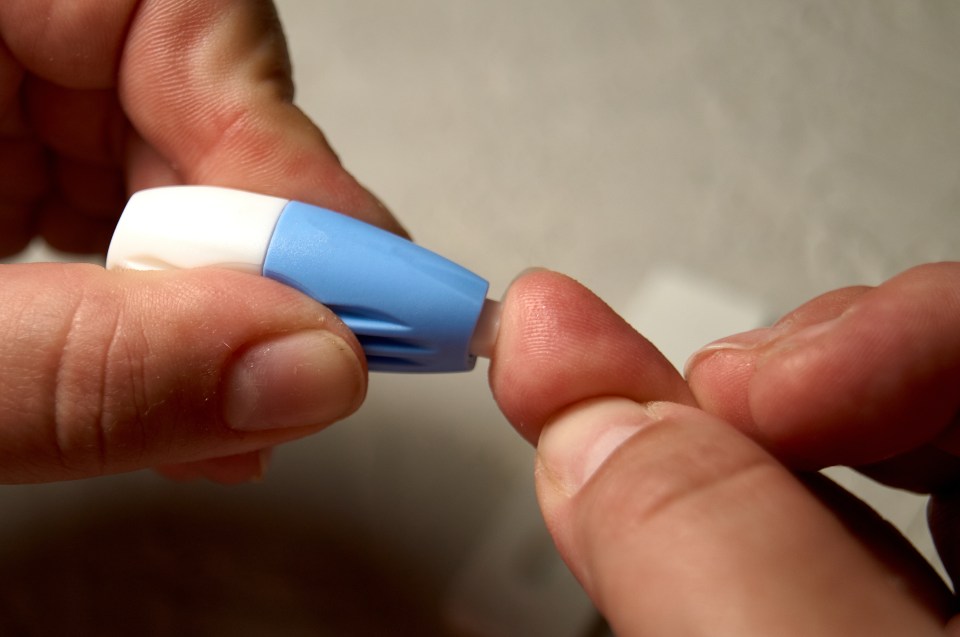THE world’s first smartphone test for type 2 diabetes has launched in the UK.
The app-based check is designed to make it easier for people to spot their risk and could help cut complications such as heart attacks, strokes, and kidney disease, which are often linked to diabetes.
Patients place a drop of blood from a finger-prick onto a chip, which is then scanned by the PocDoc app to give results almost instantly.
NHS trusts in Cumbria and the North East are the first to roll it out, with a nationwide launch planned later this year.
The Government has hailed the app as a “potential game-changer” in the fight against diabetes as results come in within minutes, instead of the days or weeks it can currently take.
Around 5.2 million people in the UK have type 2 diabetes, with cases still rising – and a further 1.3 million thought to be undiagnosed.
“Enabling screening for type 2 diabetes risk including blood biomarkers via a smartphone app is something that has never been done before,” said PocDoc chief executive Steve Roest.
Professor Julia Newton, medical director at HI NENC, said the test could reach people who struggle with conventional health checks.
“Most people over the age of 40 are invited for an NHS health check every five years, but depending on where you live a large chunk don’t attend,” she said.
“One of the reasons we’ve found is accessing a health check in a conventional setting.
“So if those tests are made more easily available, which this test does, then we have the opportunity to reach far more people.”
She added: “If you consider the number of people with diabetes who go onto have heart attacks and strokes, if we can manage their risk before it becomes a problem that will reduce admissions to hospital, reduce mortality, and reduce complications from diabetes, such as kidney disease, heart disease, and stroke disease.”
The HbA1c finger-prick test is considered the gold standard blood test. This is because it shows average blood sugar levels over the past two to three months, giving a clearer picture than daily checks.
Steve said the app fits directly with Health Secretary Wes Streeting’s 10-year NHS plan, spotting illnesses earlier, tailoring care, and shifting more testing and diagnosis into homes and communities.
“There’s a huge gap in screening for preventable diseases,” he said.
“Right now, the system, not just in the UK but worldwide, cannot find, assess, and diagnose enough people to make a dent in tackling heart attacks, strokes, and type 2 diabetes.”
Health minister Stephen Kinnock told The i Paper that the app rollout was important because type 2 diabetes is on the rise across England.
“This is a potential game-changer and exactly the type of technology we want to see in the NHS as part of the 10 Year Health Plan – bringing our health service firmly into the 21st century and care directly into people’s homes.
“We will make using the NHS as simple and convenient as online banking or shopping, while helping companies bring new technology into the health service more quickly.”
The seed of the device was planted 30 years ago when Steve was a teenager and witnessed his father having a catastrophic stroke in his early forties, due to undiagnosed cardiovascular disease (CVD).
“Using smartphones to deliver diagnostics is exactly what could have saved my dad from having so many [health] problems. He’s cost the NHS a fortune,” Steve said.
Around £9bn is spent on treating complications arising from diabetes, such as heart disease, kidney problems, and nerve damage.
Studies suggest that the annual cost of the disease could increase to £16.9 bn in the next 25 years.
The app’s launch comes 24 hours after the Government announced the biggest shake-up of diabetes care in a decade.
Around 750,000 patients with CVD or early-onset diabetes would benefit from fat jabs sooner, rather than keeping them for the later stages of treatment, new guidance states.
How do I treat type 2 diabetes?
If you’re diagnosed with type 2 diabetes, you’ll need to eat healthily, take regular exercise and have frequent checks, including blood tests.
Try to quit if you smoke, and cut down on alcohol.
Type 2 diabetes can get worse over time, and people living with the condition often need medicine, usually in the form of tablets or injections
However, some people can put their type 2 diabetes into remission by losing weight, where their blood sugar is reduced below the diabetes range.
This can often be done through a low-calorie diet, but this is not suitable for everyone, so it’s important to get medical advice first.
